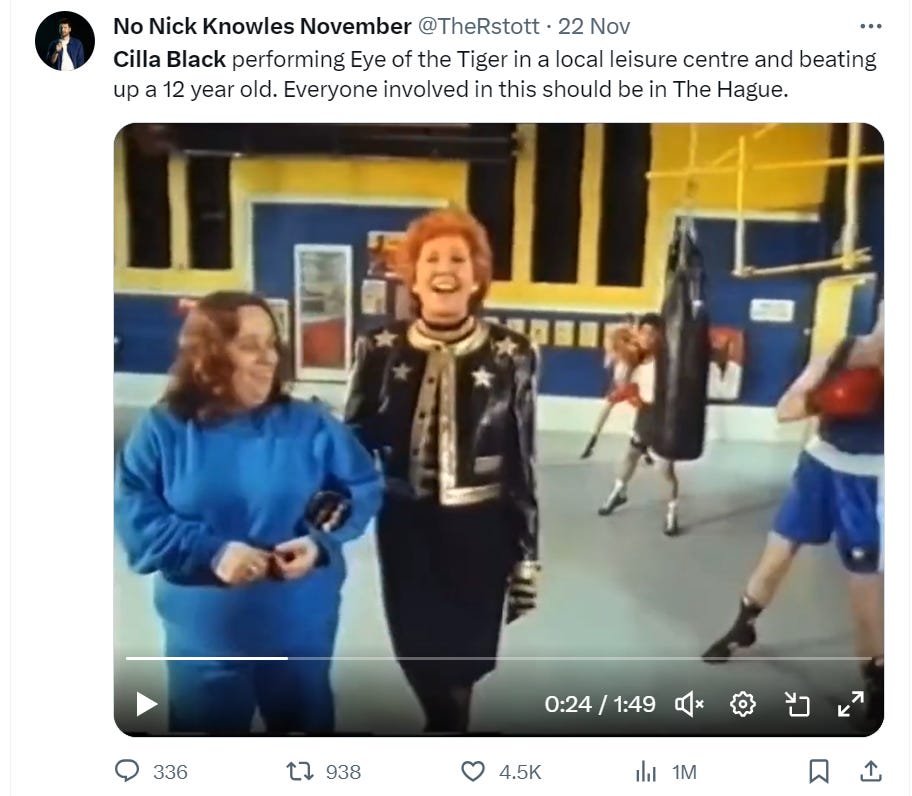Borkowski Media Trends: OpenAI, Cilla Black & University Challenge Octopusgate
OpenAI Soap Opera
Before looking into the recent OpenAI drama, let's revisit its founding ethos - the ethical development of AI for the greater good. The principle ensures that the benefits of AI are accessible to everyone, not just a privileged few, and importantly, contributes to broader societal progress. Or at least that's what they're attempting!
Recently, we learned that OpenAI is developing a new model, Q*, which is so advanced it has caused concern among within OpenAI's ranks and intensified discussions about the safe management of AI's rapid technological advancement.
So, what exactly is Q*? While it might seem simple, being able to solve basic maths problems represents an unprecedented leap in AI capabilities, arriving much earlier than anticipated. This development has alarmed both OpenAI researchers and the wider tech community.
These reports followed a tumultuous period at OpenAI. The company faced internal conflict, culminating in CEO Sam Altman’s firing. This period was marked by threats of mass staff resignations and a communications debacle that many commentators feel was poorly handled.
While we often overuse the term 'crisis', it aptly describes this major disruption for OpenAI, exacerbated by the lack of transparency surrounding Altman's dismissal and further compounded by the resignation of president and co-founder Greg Brockman.

In response to intense media scrutiny and employee backlash, Altman was reinstated after a significant "board restructuring." This saga has laid bare the immense challenges in OpenAI's governance. With ChatGPT emerging as one of the fastest-adopted pieces of software ever, OpenAI is grappling with the daunting task of keeping pace.
This situation not only presents major challenges for the organisation but also raises broader ethical questions about AI's role in our world and how we can manage its staggering rate of development.
Cilla’s Surprise Surprise ResurreXion
A few weeks ago we talked in the context of The Beatles’ Now & Then about the fine line, when reviving a cultural heirloom, between resurrection and necromancy.
This is hard to control when those in charge of the legacy are responsible for the comeback; harder still when the comeback is exogenously manufactured by others.
This week we saw Cilla Black, dearly departed national treasure, go viral on social media, particularly X (né Twitter), in a way that was without a logical cause, and not universally hagiographic.
The mostly good-natured ribbing initially centred on viral shared clips of the star’s distinctive warbling singing voice, but spread to include inter alia her unfiltered on-air opinions, and a meme comprising exaggerated fictional anecdotes about supposed diva behaviour.
Viral trends and particularly meme culture often function like an ‘in-joke’ in which millions of people take part, with an added element of competition to create the most popular derivation (which on social media can even be measured in likes and shares) perpetuating the initial burst of popularity.
It often only exists within the social media bubble but can have real life consequences.
As discussed last month when The Rock’s Musée Grévin waxwork figure spiralled from a meme into a genuine potential scandal with racial undertones, becoming subject to one of these viral wildfires can genuinely impact a reputation or legacy, particularly for those lacking active output or a means of responding directly.
While Cilla’s national treasure status is robust enough to weather a few sideways comments on X, the scale, variety and persistence of this viral meme about a long-departed star from a bygone era - that erupted for no good reason at all- serves as a reminder that even the most light-hearted and inconsequential elements of modern mass media are powerful enough to shake the most firmly established legacies.
University Challenge ‘Octopusgate’: A Kafkaesque New Level of Cancel Culture
Those who felt sorry for M&S after a coincidental colour arrangement landed their Christmas advert in hot water might feel similar sympathy for the BBC and one University Challenge contestant after a similar colour arrangement and an octopus mascot were interpreted by some viewers (particularly on social media) as a prejudicial comment on the ongoing Middle East crisis.
The fact that the episode was filmed in March did not spare the teacup from the tempest: although most prominent commentators dismissed the incident as a non-story, numerous news outlets felt it carried enough weight to merit coverage and the BBC felt sufficient pressure that they released perhaps the most exasperated press office statement of the year to date.
Between Octopusgate and the M&S advert, we appear to have reached a Kafkaesque new stage of cancel culture, in which amateur semioticians are divining secret symbolic ciphers, apparently sent from the past by those with magical precognitive abilities, using the surprising medium of British pop-culture ephemera.
Our tense and polarised cultural and political epoch has already forced most public figures, entities and brands to walk on eggshells for fear of causing offence, often to the detriment of creativity and purpose. This latest theatre of the absurd will be unlikely to restore confidence.


